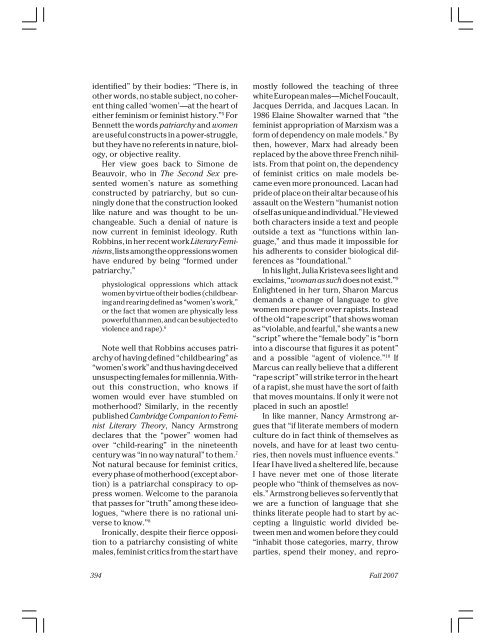Feminist Literary Criticism: From Anti-Patriarchy to Decadence
Feminist Literary Criticism: From Anti-Patriarchy to Decadence
Feminist Literary Criticism: From Anti-Patriarchy to Decadence
Create successful ePaper yourself
Turn your PDF publications into a flip-book with our unique Google optimized e-Paper software.
identified” by their bodies: “There is, in<br />
other words, no stable subject, no coherent<br />
thing called ‘women’—at the heart of<br />
either feminism or feminist his<strong>to</strong>ry.” 5 For<br />
Bennett the words patriarchy and women<br />
are useful constructs in a power-struggle,<br />
but they have no referents in nature, biology,<br />
or objective reality.<br />
Her view goes back <strong>to</strong> Simone de<br />
Beauvoir, who in The Second Sex presented<br />
women’s nature as something<br />
constructed by patriarchy, but so cunningly<br />
done that the construction looked<br />
like nature and was thought <strong>to</strong> be unchangeable.<br />
Such a denial of nature is<br />
now current in feminist ideology. Ruth<br />
Robbins, in her recent work <strong>Literary</strong> Feminisms,<br />
lists among the oppressions women<br />
have endured by being “formed under<br />
patriarchy,”<br />
physiological oppressions which attack<br />
women by virtue of their bodies (childbearing<br />
and rearing defined as “women’s work,”<br />
or the fact that women are physically less<br />
powerful than men, and can be subjected <strong>to</strong><br />
violence and rape). 6<br />
Note well that Robbins accuses patriarchy<br />
of having defined “childbearing” as<br />
“women’s work” and thus having deceived<br />
unsuspecting females for millennia. Without<br />
this construction, who knows if<br />
women would ever have stumbled on<br />
motherhood? Similarly, in the recently<br />
published Cambridge Companion <strong>to</strong> <strong>Feminist</strong><br />
<strong>Literary</strong> Theory, Nancy Armstrong<br />
declares that the “power” women had<br />
over “child-rearing” in the nineteenth<br />
century was “in no way natural” <strong>to</strong> them. 7<br />
Not natural because for feminist critics,<br />
every phase of motherhood (except abortion)<br />
is a patriarchal conspiracy <strong>to</strong> oppress<br />
women. Welcome <strong>to</strong> the paranoia<br />
that passes for “truth” among these ideologues,<br />
“where there is no rational universe<br />
<strong>to</strong> know.” 8<br />
Ironically, despite their fierce opposition<br />
<strong>to</strong> a patriarchy consisting of white<br />
males, feminist critics from the start have<br />
mostly followed the teaching of three<br />
white European males—Michel Foucault,<br />
Jacques Derrida, and Jacques Lacan. In<br />
1986 Elaine Showalter warned that “the<br />
feminist appropriation of Marxism was a<br />
form of dependency on male models.” By<br />
then, however, Marx had already been<br />
replaced by the above three French nihilists.<br />
<strong>From</strong> that point on, the dependency<br />
of feminist critics on male models became<br />
even more pronounced. Lacan had<br />
pride of place on their altar because of his<br />
assault on the Western “humanist notion<br />
of self as unique and individual.” He viewed<br />
both characters inside a text and people<br />
outside a text as “functions within language,”<br />
and thus made it impossible for<br />
his adherents <strong>to</strong> consider biological differences<br />
as “foundational.”<br />
In his light, Julia Kristeva sees light and<br />
exclaims, “woman as such does not exist.” 9<br />
Enlightened in her turn, Sharon Marcus<br />
demands a change of language <strong>to</strong> give<br />
women more power over rapists. Instead<br />
of the old “rape script” that shows woman<br />
as “violable, and fearful,” she wants a new<br />
“script” where the “female body” is “born<br />
in<strong>to</strong> a discourse that figures it as potent”<br />
and a possible “agent of violence.” 10 If<br />
Marcus can really believe that a different<br />
“rape script” will strike terror in the heart<br />
of a rapist, she must have the sort of faith<br />
that moves mountains. If only it were not<br />
placed in such an apostle!<br />
In like manner, Nancy Armstrong argues<br />
that “if literate members of modern<br />
culture do in fact think of themselves as<br />
novels, and have for at least two centuries,<br />
then novels must influence events.”<br />
I fear I have lived a sheltered life, because<br />
I have never met one of those literate<br />
people who “think of themselves as novels.”<br />
Armstrong believes so fervently that<br />
we are a function of language that she<br />
thinks literate people had <strong>to</strong> start by accepting<br />
a linguistic world divided between<br />
men and women before they could<br />
“inhabit those categories, marry, throw<br />
parties, spend their money, and repro-<br />
394 Fall 2007
















